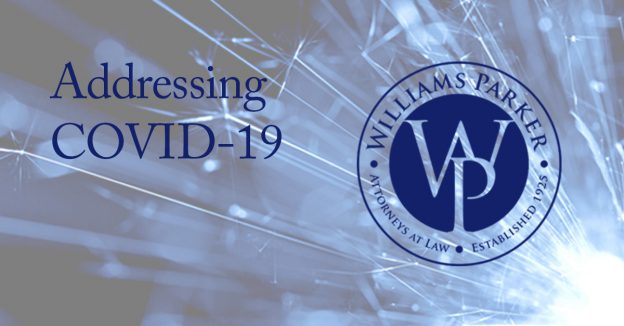IRS Extends Additional Key Tax Deadlines, Provides CARES NOL Guidance
On Thursday, April 9, 2020, the Internal Revenue Service (“IRS”) released two notices and one revenue procedure offering additional filing and payment relief for taxpayers and providing procedural guidance on a main business tax provision of the Coronavirus Aid, Relief, and Economic Security (“CARES”) Act.
Extension of Deadlines for Generally All Federal Tax Filings
Notice 2020—23 which “amplifies” Notice 2020-18 and Notice 2020—20 (discussed in a previous blog post) to include any person with a specified Federal tax payment obligation or Federal tax return or other form filing obligation due on or after April 1, 2020, and before July 15, 2020, in the definition of Affected Taxpayer. This includes individuals, trusts, estates, corporations, and other non-corporate tax filers, including Americans who live and work abroad. The deadline is automatically postponed to July 15, 2020.
Among other payment and filing obligations, the following are specifically included in Notice 2020-23:
- U.S. Estate (and Generation-Skipping Transfer) Tax Returns (Form 706)
- U.S. Income Tax Returns for Estates and Trusts (Form 1041)
- Information Regarding Beneficiaries Acquiring Property from a Decedent (Form 8971)
- U.S. Nonresident Alien Income Tax Returns (Form 1040-NR)
- U.S. Corporation Income Tax Returns (Form 1120)
- U.S. Income Tax Returns for S Corporations (Form 1120-S)
- U.S. Returns of Partnership Income (Form 1065)
- Exempt Organization Business Income Tax Returns (Form 990-T)
- Estimated Tax for Individuals (Form 1040-ES)
- Estimated Income Tax for Estates and Trusts (Form 1041-ES)
The three-month relief provided under Notice 2020—23 to an Affected Taxpayer is automatic, and therefore, there is no requirement to file an Application for Automatic Extension to obtain the benefit of the filing and payment postponement deadline of July 15, 2020. However, the Affected Taxpayer must file the appropriate form for an extension of time by July 15, 2020, to obtain an extension to file until October 15, 2020. Nevertheless, any tax payments will still be due on July 15, 2020.
Accordingly, the period beginning on April 15, 2020, and ending on July 15, 2020, will be disregarded in the calculation of any interest, penalty, or addition to tax for failure to file or to pay. Interest, penalties, and additions to tax with respect to such postponed Federal tax filings and payments will begin to accrue on July 16, 2020.
CARES NOL Guidance
Just one day after the issuance of Revenue Procedure 2020—23, allowing eligible partnerships to file amended partnership returns, as discussed previously, the IRS followed up with procedural guidance with regard to making certain NOL elections under the CARES Act. The IRS also extended the deadline for taxpayers seeking “quick refunds” for 2018 net operating losses (NOLs).
Revenue Procedure 2020-24 provides guidance to taxpayers with net operating losses that are carried back under the CARES Act. The specific guidance includes procedures for:
- waiving the carryback period in the case of an NOL arising in taxable years beginning in 2018, 2019, and 2020;
- disregarding certain amounts of foreign income subject to transition tax that would normally have been included as income during the five-year carryback period; and
- waiving a carryback period, reducing a carryback period, or revoking an election to waive a carryback period for a taxable year that began before Jan. 1, 2018, and ended after Dec. 31, 2017.
As stated in our previous post, taxpayers must elect out of the CARES Act NOL carryback. An election to waive the carryback for NOLs arising in tax years beginning in 2018 or 2019 must be made no later than the due date, including extensions, for filing the taxpayer’s federal income tax return for the first tax year ending after March 27, 2020. A taxpayer makes the election by attaching to its federal income tax return filed for the first tax year ending after March 27, 2020, a separate statement for each of the tax years 2018 or 2019 for which the taxpayer intends to make the election. The election statement must state that the taxpayer is electing to apply Internal Revenue Code section 172(b)(3) under Rev. Proc. 2020-24 and the tax year for which the statement applies.
Notice 2020-26 grants a six-month extension of time to file Form 1045, Application for Tentative Refund, or Form 1139, Corporation Application for Tentative Refund, as applicable, with respect to the carryback of a net operating loss that arose in any taxable year that began during calendar year 2018 and that ended on or before June 30, 2019. To file for these quick refunds, individuals, trusts, and estates would file Form 1045, and corporations would file Form 1139.
Starting on April 17, 2020, and until further notice, the IRS will accept eligible refund claims on Form 1139 submitted via Fax to 844-249-6236 and eligible refund claims on Form 1045 submitted via fax to 844-249-6237. These fax numbers will not be operational prior to April 17. The IRS is encouraging taxpayers to wait until this procedure is available rather than mailing their Forms 1139 and 1045, as mail processing is being impacted by the COVID-19 emergency. This same procedure may be used by a corporate taxpayer claiming a refund for the acceleration of the recovery of remaining minimum tax credits for its 2018 or 2019 taxable years.
The IRS has released an FAQ to answer common questions associated with this new procedure.
This was post was co-Authored by Alyssa L. Shook

